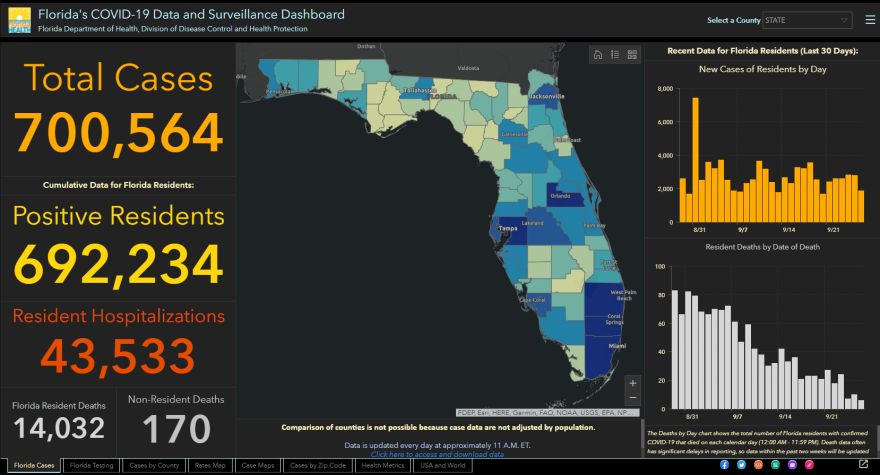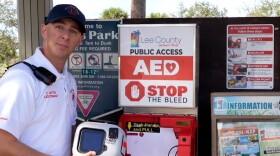State health officials reported 1,882 new COVID-19 cases, Sunday, bringing Florida's total to 700,564 cases. The Florida Department of Health also reported 10 new coronavirus-related deaths, Sept. 27, increasing the statewide death toll to 14,202 fatalities.
On Saturday, Florida health officials reported 2,795 new COVID-19 cases and 107 deaths.
Of the 5,260,602 COVID-19 tests that have been reported in Florida so far, the overall positivity rate has dropped to 13.32%. The latest single-day positivity rate stands at 4.07%.
Here in the Southwest Florida region including Charlotte, Collier, Glades, Hendry, Lee, Manatee and Sarasota Counties, state health officials have reported 58,306 cases of the virus and 1,407 coronavirus-related deaths since the beginning of the pandemic.
Governor Ron DeSantis has removed state-wide operating restrictions for bars and restaurants. Under an order signed Friday, the businesses will be able to return to full capacity indoors. It's a change from the 50% capacity limit that had been in place as part of an effort to stop the spread of the coronavirus.
“There will not be limitations from the state of Florida. In fact, we’re cognizant about the need for business certainty," DeSantis said during a press conference Friday. "There have been some local closures and other types of restrictions. The order I’m signing today will guarantee restaurants can operate—it will not allow closures. They can operate at a minimum of 50% regardless of local rule."
DeSantis says local governments can make some restrictions, but they won’t be able to keep bars or restaurants from operating at less than 50% capacity. And they’ll be required to explain any limits they do set.
The order also extends to other types of businesses, like banquet halls, which DeSantis said have been blocked from operating in some communities.
“Every business has a right to operate. Some of the locals, they can do reasonable regulations, but you can’t just say no. You can’t say no after six months and have them just twisting in the wind.”
The governor acknowledges coronavirus cases could increase as part of what some are calling a "second wave." He says state healthcare workers are ready for that and he doesn’t expect the need for a return to statewide closures in the future.
“We’re prepared if we see an increase. We’re not closing anything going forward. But I think if you look at our hospital capacity, if you look at what we did to marshal all the latest medications, if you look at the PPE, we have what we need," DeSantis said.
Meanwhile, some are already pushing back on the governor’s reopening plan. Florida PIRG, a public interest research group, argues allowing bars and restaurants to reopen for full capacity indoor dining could prolong the spread of the coronavirus, and delay recovery for some parts of the state’s economy.
N95 masks remain in short supply in the U.S. more than six months into the COVID-19 pandemic. Imported KN95 masks are not a safe replacement according to the independent, non-profit organization ECRI. It’s certified by the federal government to research patient safety.
ECRI President Dr. Marcus Schabacker said they found that 60% to 70% of the foreign-made masks do not provide the same level of protection as N95 masks.
“That causes great concern because these KN95 masks are potentially used by healthcare workers in high-risk situations such as intubating COVID-19 patients or doing airway management suctioning, even swabbing our COVID-19 patients where there’s a high viral load,” said Dr. Schabacker.
N95 masks filter at least 95% of small airborne particles, like those that spread the coronavirus. KN95 masks are manufactured in China and held to different standards.
People can safely use them at supermarkets, for example, where others are wearing masks.
WGCU is your trusted source for news and information in Southwest Florida. We are a nonprofit public service, and your support is more critical than ever. Keep public media strong and donate now. Thank you.










